Gary Levitt On Audio Filters, Monetization, And User Feedback
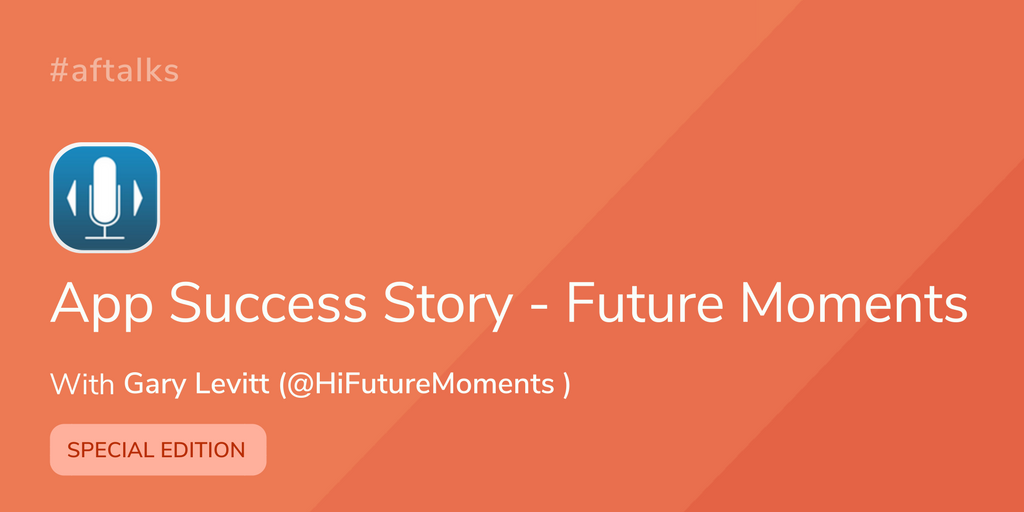
Welcome to our #AFtalks Special Edition recap – App Success Stories!
App Success Stories is a new series where we talk to developers about their journeys, motivation, and how they got where they are today so others can learn from their experiences.
The story & guest this week was Gary Levitt, the Co-Founder of FutureMoments, the makers behind such apps as MicSwap, AudioFix, and AudioMaster. Below you’ll find his answers, as well as some relevant resources:

Q1: How did you come up with the idea for your app?
A: Each app has its own story:
MicSwap started as a joke in band practice. While recording on the iPhone, I swiped the generic mic graphic & said lets record with the Neumann U47. Pretty nerdy joke, but I realized it could be a real thing. Since each mic has its own sound it’d be like an Instagram for audio.
AudioFix: For Videos came about from my frustration trying to hear many YouTube videos on my phone. Too many were either not loud enough or had crappy sound. After cupping my hand around the phone to amplify the video too many times, I thought of the fix.
AudioMaster was a natural step from MicSwap. In the audio engineering world, mastering is the final step in the process. Mastering amplifies, compresses and equalizes the sound to make it sound as good or better than other audio on the varieties of speakers & headphones.
Q2: Did you build/design it yourself or outsource? Why?
A: Yes. Everything we do is in-house except for the occasional graphic design when we’re unhappy with what we’ve come up with.

Q3: What sort of challenges did you face when building the app?
A: With MicSwap we really wanted users to have the most flexibility as possible. This meant applying the mic filter after the recording while not having there be any delay. We got it, and now you can monitor in real time with the filter applied. You can’t do this in Apples Voice Memos.
Q4: Marketing is a crucial element of an app’s success. What does your current marketing plan look like, and how has it evolved since launch?
A: We’ve experimented with ads on Facebook, Instagram and Twitter, but have currently found that Apples search ads, word of mouth and press releases have been the most fruitful.

Q5: Which marketing channels do you rely on for promotion?
A: Currently we rely on Apples search ads, word of mouth through events and networking, as well trying to get reviewed in as many places as possible.
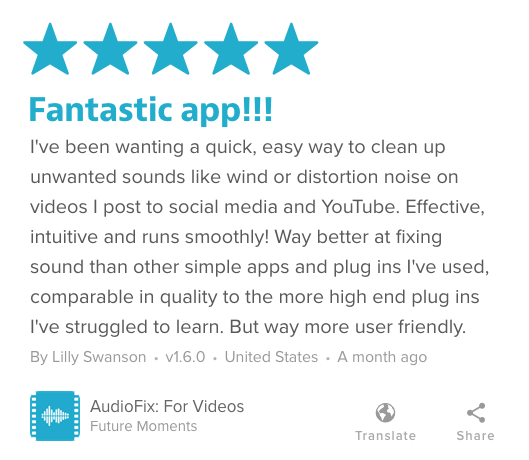
Q6: What kind of challenges did you encounter marketing the app after launch?
A: The biggest challenge is trying to get that Editors pick on the App Store. MicSwap is one of the most gorgeous and unique apps in the music category, so I’m surprised it has yet to be featured. There’s no other app of it’s kind. I think it makes the iPhone look incredibly cool.
Q7: If you knew back then what you know now, how would you have approach marketing?
A: We’ve been pretty frugal with our marketing budget so I’m not sure there’s much we regret except for wishing we released the apps earlier when there was less clutter in the App Store.
Q8: What is your monetization strategy, and how has it changed over time?
A: We currently have 3 kinds employed: freemium, subscription and paid apps. AudioFix and AudioMaster are available as a subscription or paid. We try to cater to everyone’s preferences. Some people hate subscriptions so we also offer a paid model.
Q9: Have you tried experimenting with different strategies and price points?
A: Yep, and we’ve found we can’t please all the people all of the time so we try and please as many people as we can.
Q10: When it comes to apps, users play a major role in providing feedback through reviews. Do you incorporate user feedback into planning new features for the app? If so, how do evaluate suggestions?
A: Yes, very much so. We regularly ask our users what features they’d like to see added. We respond to every email. Everyone uses our apps in their own way, so it’s enlightening to get a users feedback. We’ve already incorporated some requests into free updates for each of our apps.
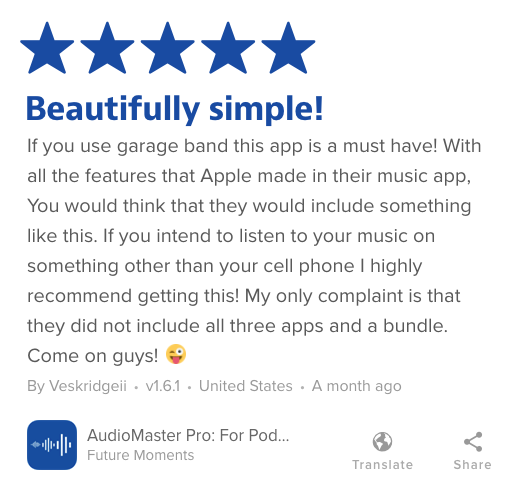
Q11: Starting something new requires making hard decisions. Were there any decisions that were particularly hard?
A: Finding the right people to work with is the hardest decision we’ve had to make. Finding the right partners is so crucial to success.
Q12: How do you measure success? Are there any particular metrics you focus on?
A: I measure success by growth & user feedback. We’ve been growing in # of users & revenue month over month pretty nicely, but it wouldn’t feel like success without knowing we were offering something useful. Getting good feedback from our users lets me know how we’re doing.
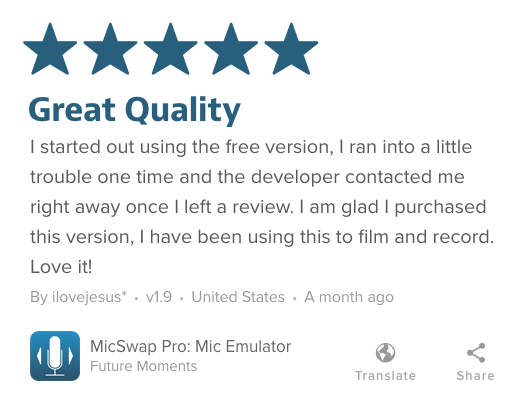
Q13: What was the first success you remember for the app?
A: Having a stable build of our first app MicSwap gave me a great feeling. Seeing an idea come into tangible reality was amazing. We had a great first week and pretty quickly got written up in TechCrunch, but the first success was having that stable build in my hand.
Q14: How do you plan on evolving the app and growing its user base?
A: We’re already working on our next app with others on deck. We also have some nice features we want to add to the existing apps. Our users are going to be able to add to the bundles and soon Future Moments could have musicians, podcasters, filmmakers etc totally covered.
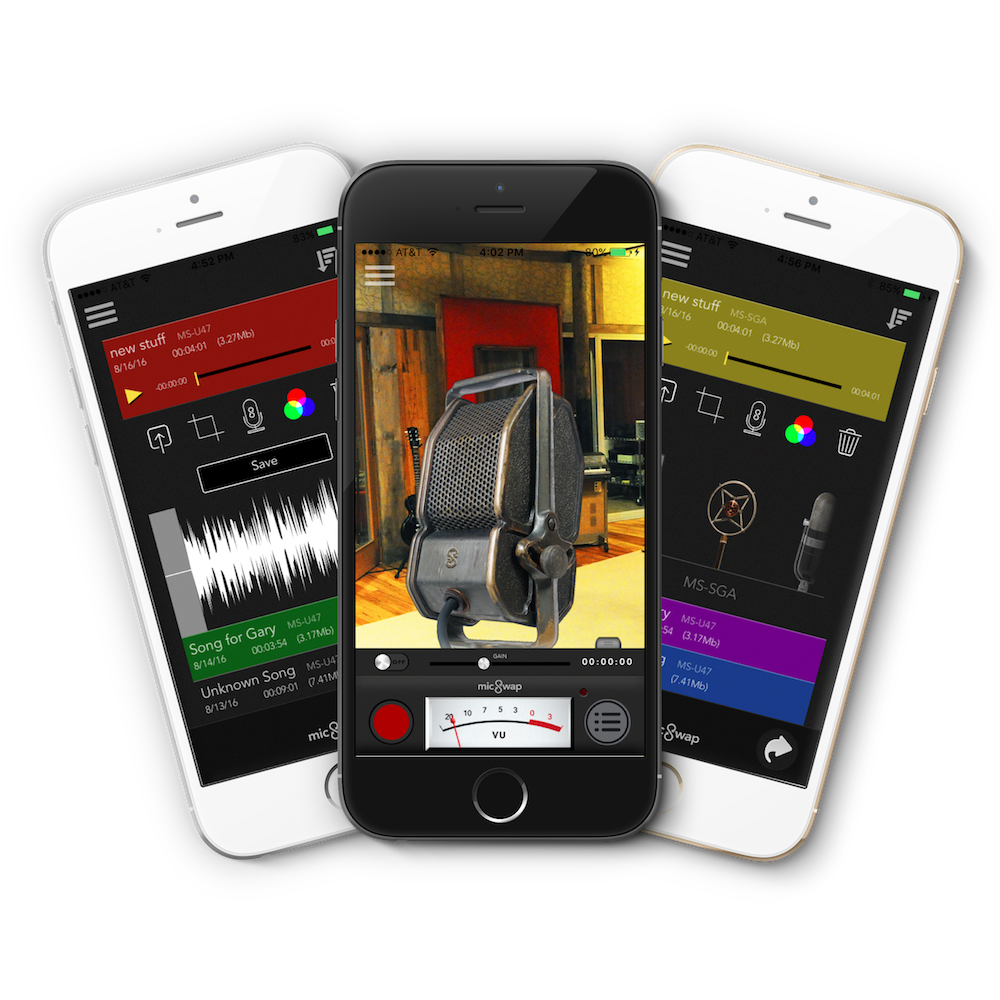
Final Thoughts:
Which more closely resembled where your initial #idea came from for your #app? 🤔 #poll #AFtalks
— Appfigures (@appfigures) November 28, 2017
Want to be featured on our next #AFtalks and blog? Message us for a chance to be on our next success story!
Check out the rest of the insights we heard today on the #AFtalks hashtag.
Huge thanks to Gary and to all those that were part of today’s discussion! Join us for our weekly Twitter chat every Tuesday at 2pm ET (bring your friends!). See you all next week!
Resources: